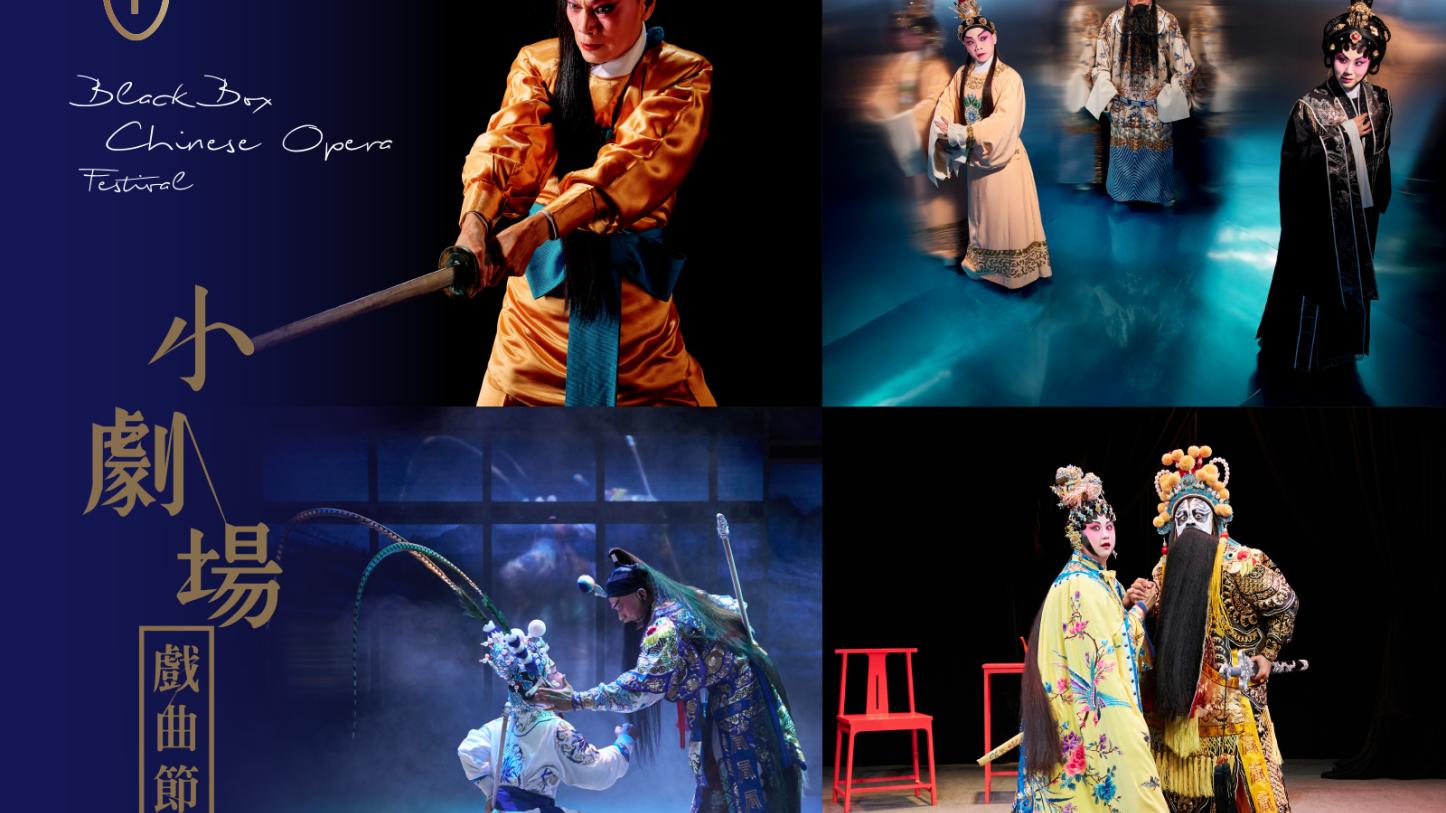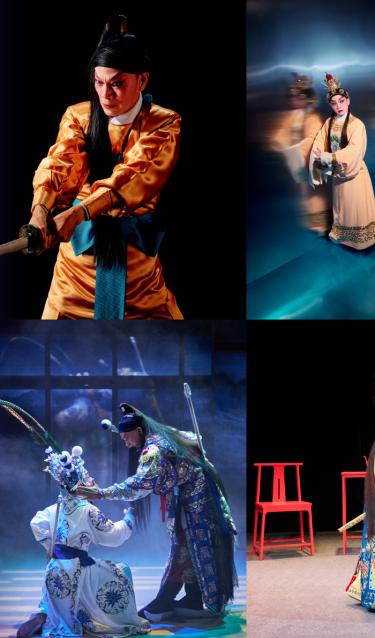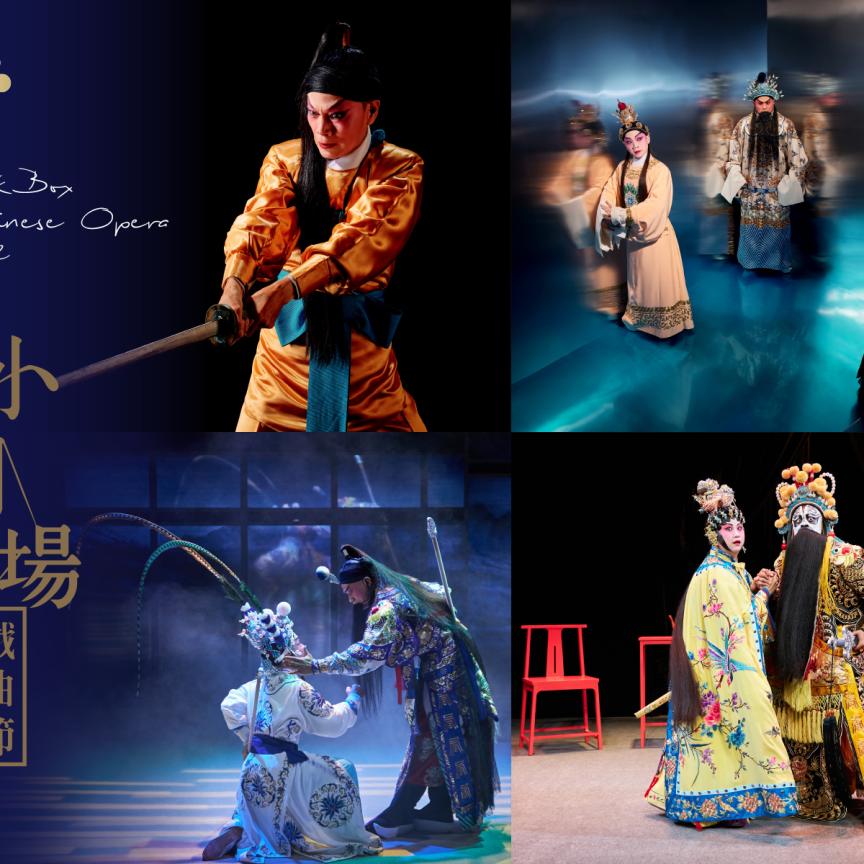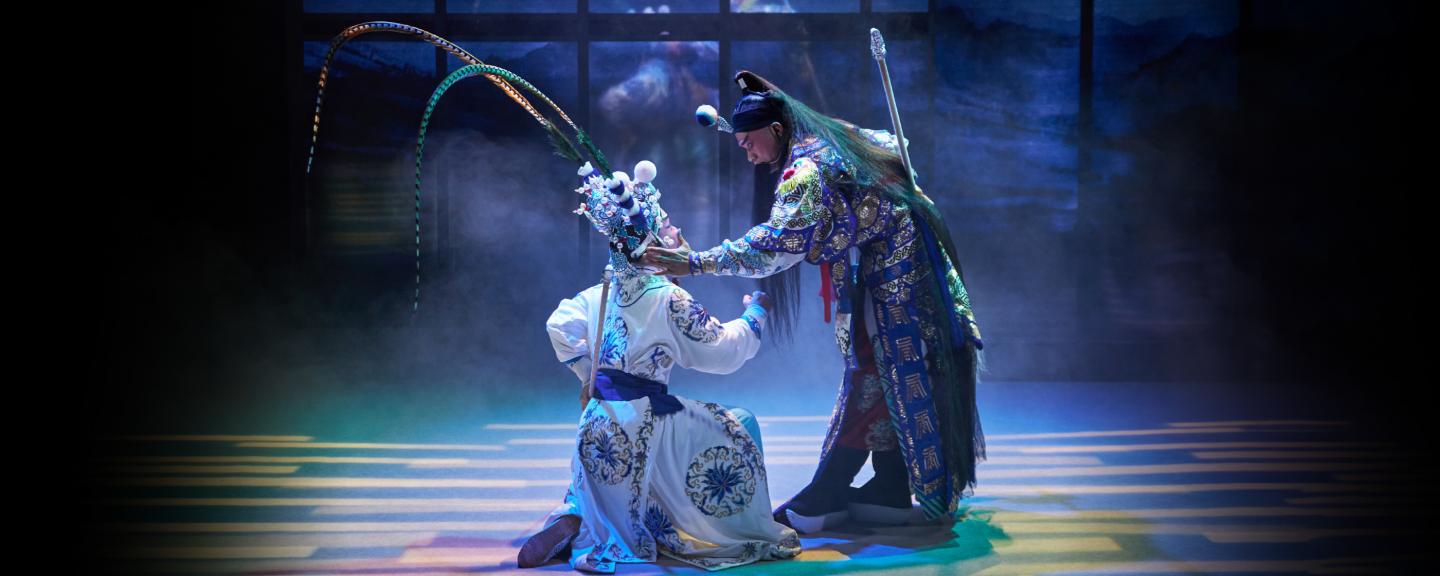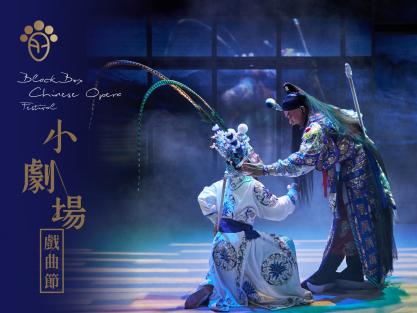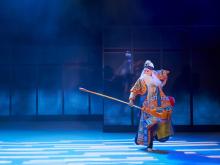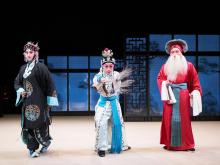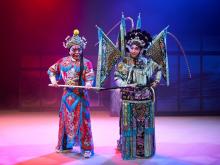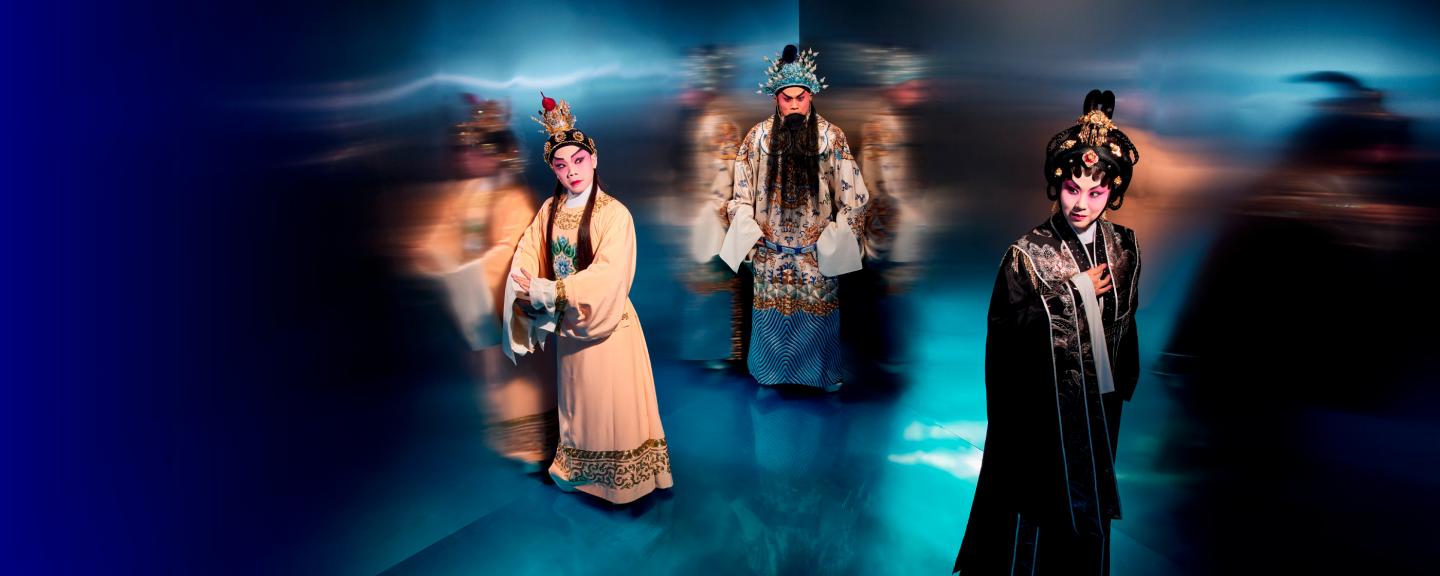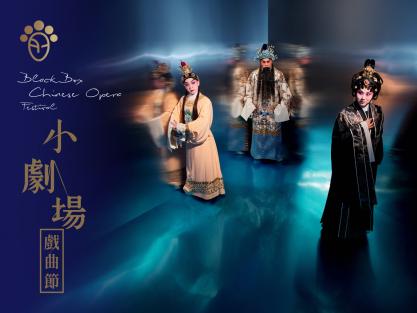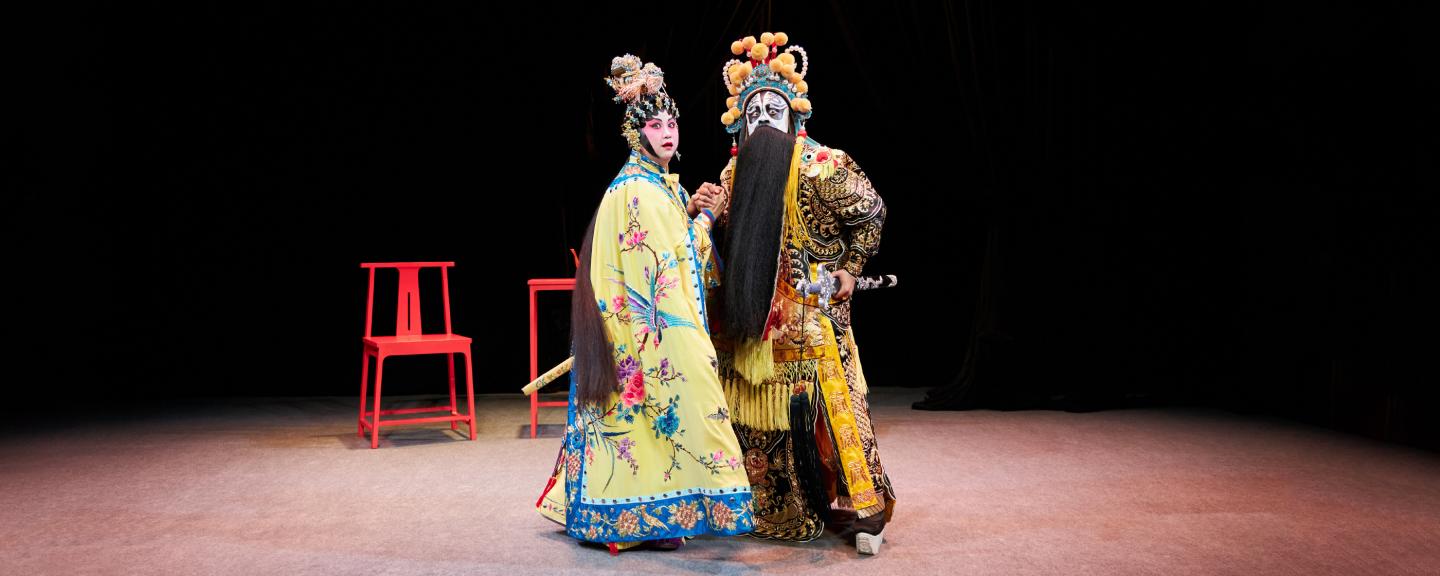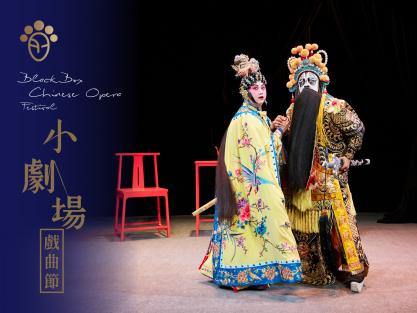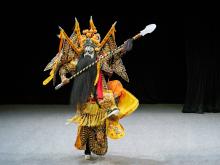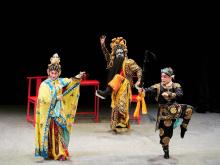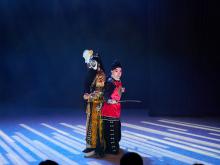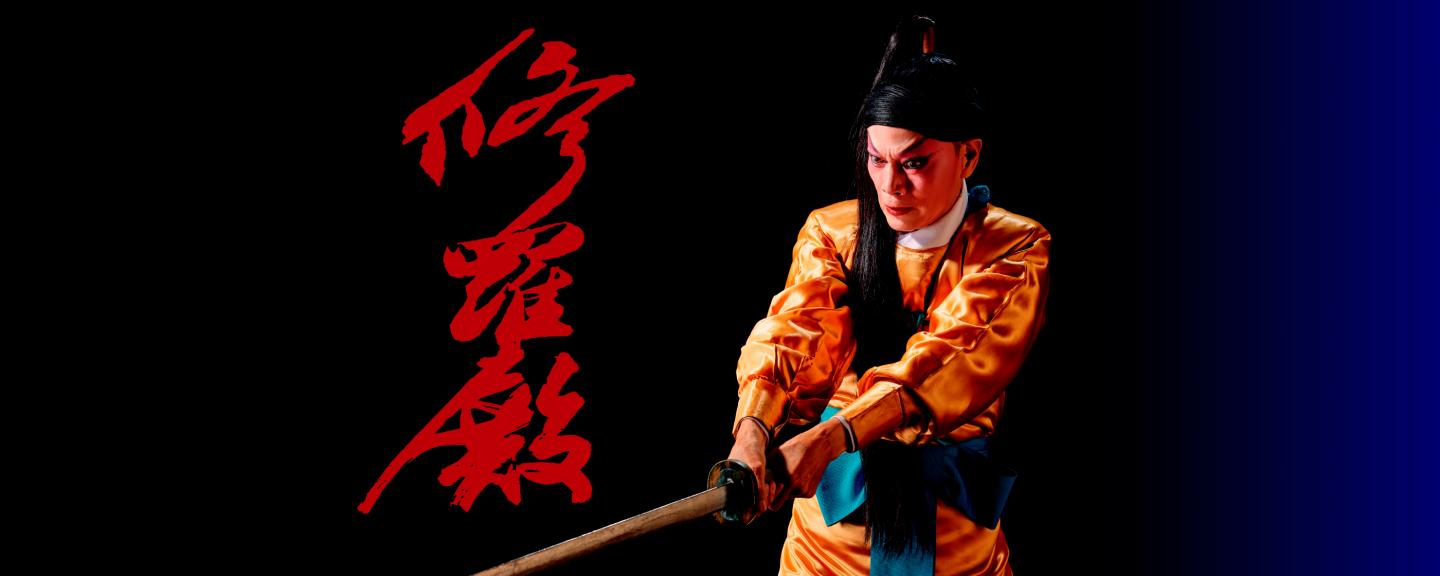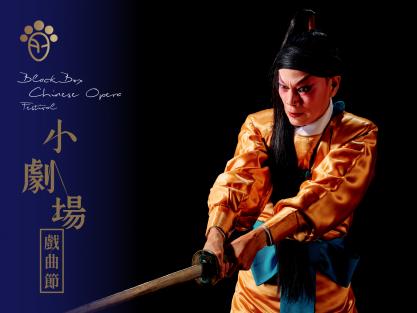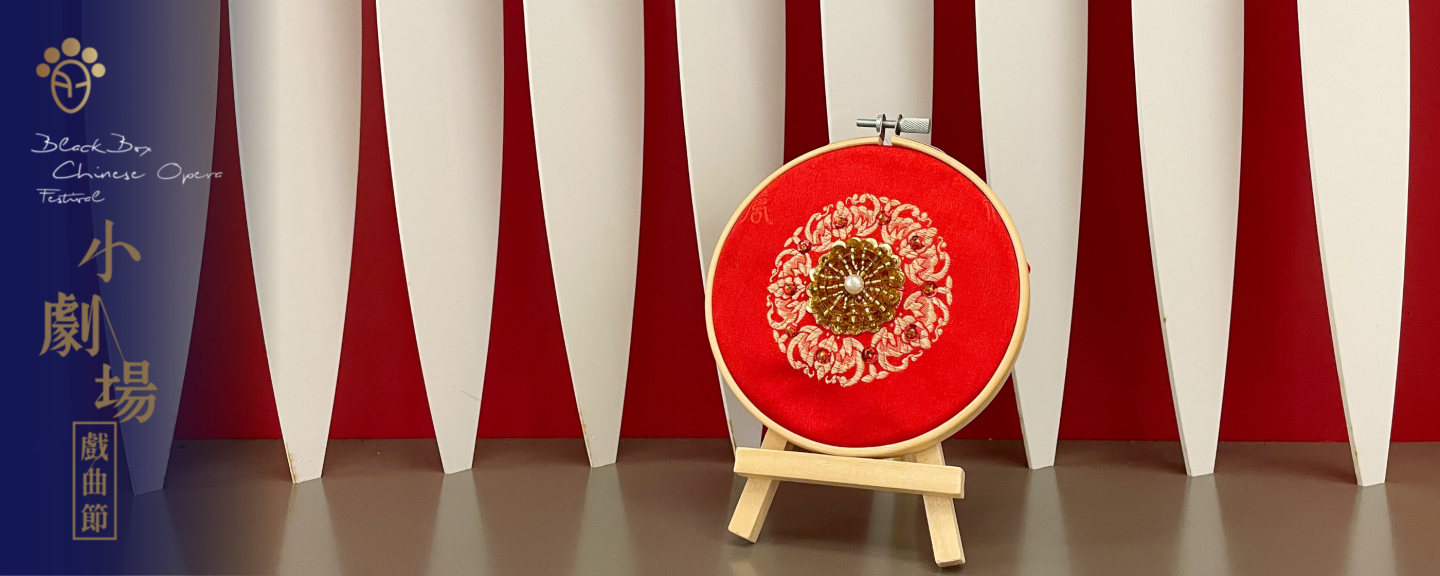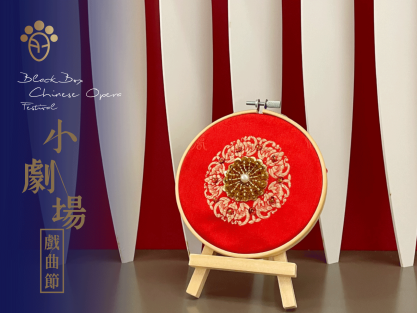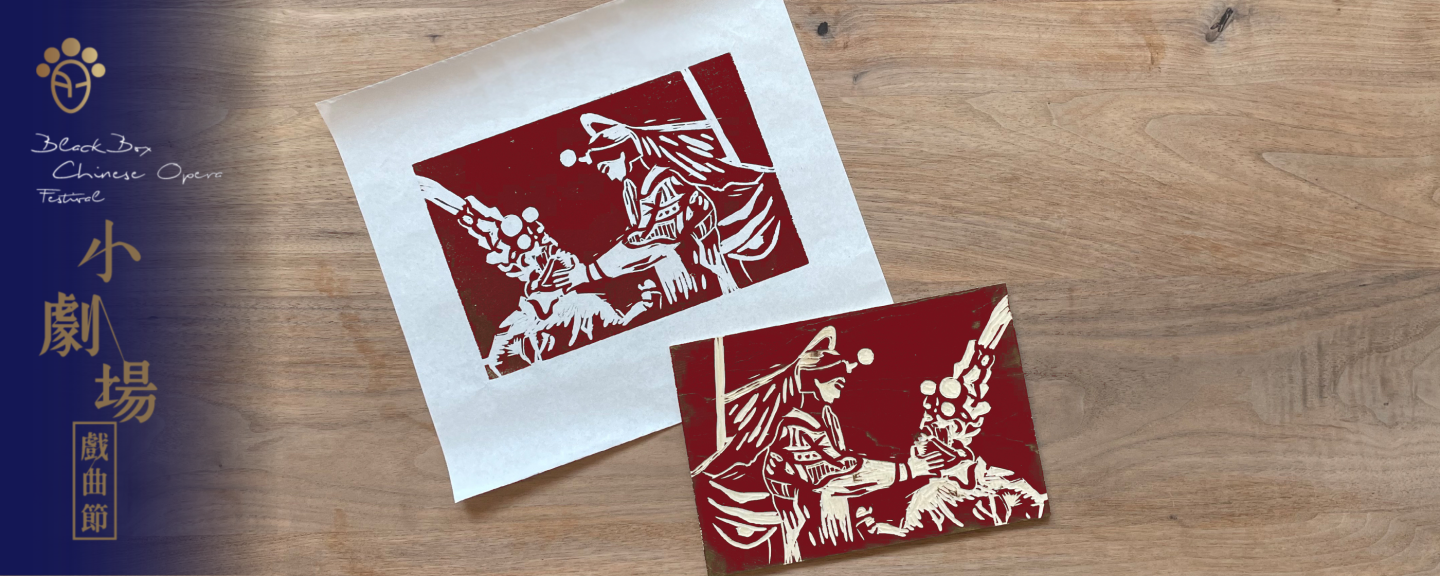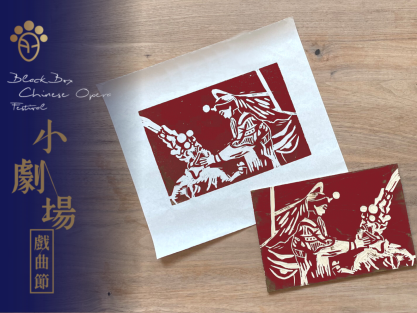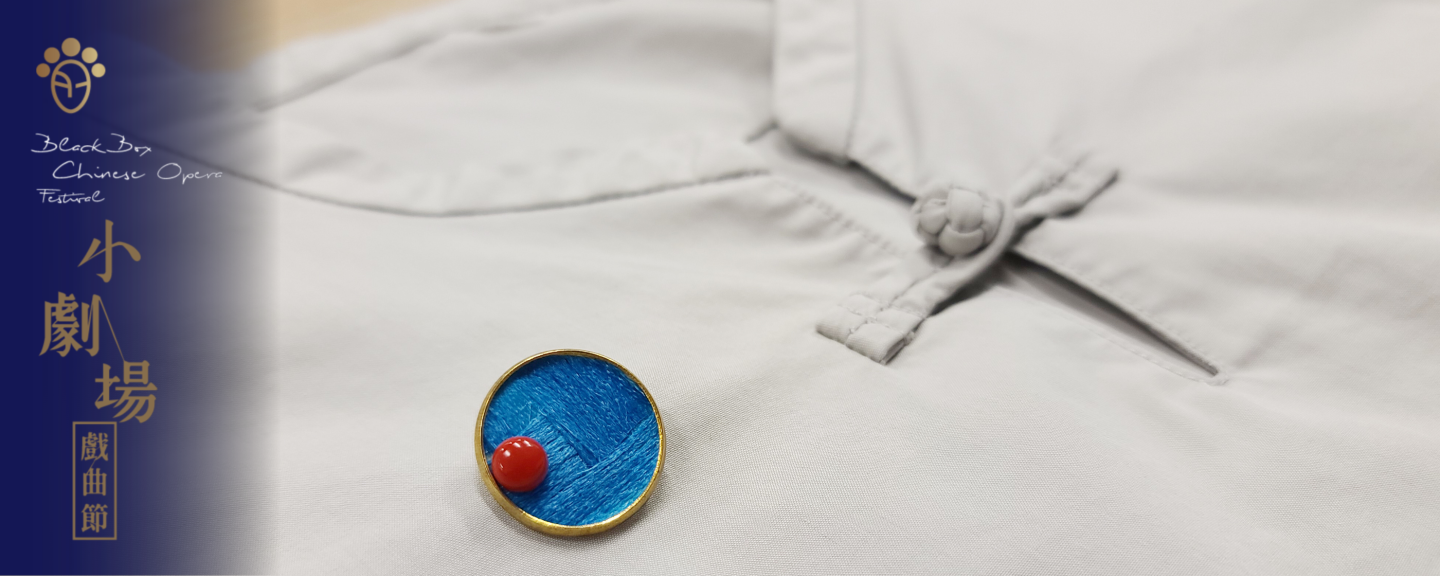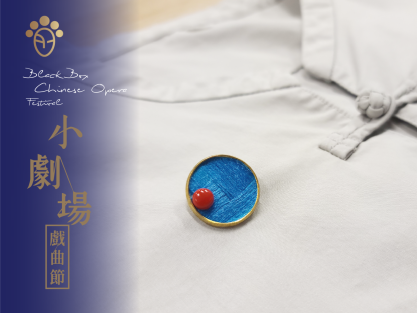Xiqu Centre Original Production: Experimental Cantonese Opera “Wenguang Explores the Valley”
Main
Description
The Xiqu Centre’s second experimental Cantonese opera production combines traditional and new set pieces, digital backdrops and other modern theatre technology to illustrate the preservation and innovation of Cantonese opera in the modern era.
Awards
- “Best Play (Contemporary Small Theatre–Xiqu category)” by Beijing New Arts and Culture Outstanding Theatre Showcase Series 2018
- “Best Performer (Contemporary Small Theatre–Xiqu category)” (Keith Lai) by Beijing New Arts and Culture Outstanding Theatre Showcase Series 2019
- “Honorary Credential Award” by Xiqu Opera Black Box Festival (Beijing) 2019
“A powerful performance, and a well-deserved Best Actor win for Keith Lai.”
── Pak Yiu-charn, Hong Kong theatre artist
“A clever blend of tradition and technology…Needless to say the actors’ hard work in portraying the characters.”
── Ms Ng Mei-ying, Cantonese opera veteran
Title Sponsor:
Produced by:

Artistic and Production Team:
Producer / Director: Naomi Chung*
Playwrights / Directors / Music Arrangers: Keith Lai, Janet Wong
Technical Director: Rae Wu*
Set Designer: Wong Yat-kwan
Lighting Designer: Leo Siu
Sound Designer: Wan San-hong
Sound Designer (2019 Beijing Premiere): Anthony Yeung
Video Designer: Dan Fong
Assistant Producer: Peter Lee*
Production Managers: Fanny Lo*, Katrina Chan*
Producer’s assistants: Novia Chong, *Hazel Yau*
Cast:
Keith Lai as Yang Jiye/Yang Zongbao
Janet Wong as Yang Qiniang (Du Jiner)
Ng Lap-hei as Yang Wenguang
Shum Pak-chuen as Yang Hong/Wang Wen
Musicians:
Percussion Leader: Mao Yijun
Percussion Ensemble Leader: Chan Ting-pong
Musicians: Zhong Shi-ling, So Siu-fun, Wong Yuen-ling, Lai Ka-wai, Ho Cheuk-chun, Leung Shuk-in, Chen Yi-fan, Ko Wing-hei, He Zhuotao
*Staff of West Kowloon Cultural District
Additional info
Tabs
Following on from the Xiqu Centre’s first experimental Cantonese opera production – Farewell My Concubine (New Adaptation), a contemporary reinterpretation of a traditional classic showcasing the evolution of Cantonese opera – this second production, Wenguang Explores the Valley, reinterprets a classic warrior legend as a contemplation of the preservation and innovation of Cantonese opera in the modern era.
Retaining the original plot structure and a number of set pieces – including “The Great Battle”, “The Besieged Valley”, and the classic song “Yang Jiye Crashes into the Stone Tablet” – the work also incorporates several new scenes, such as a pivotal act where the late general Yang Jiye appears to his grandson Wenguang in a dream. As well as the addition of original script, the production replaces traditional backdrops with digital projections – both realistic and abstract, static and animated – offering a multi-layered illusory element to the settings and battle scenes. In one newly created scene, a key character moves among the audience to find an important book, reminding spectators that the things we seek are often right there beside us.
Based on the historic legends of the Yang family generals, the story opens with protagonist Wenguang contemplating the past glories and defeats of his clan – an analogy for the legacy of Cantonese opera. Then, through scenes of past Yang battles and debates between influential figures, the production contemplates the value and meaning of ancient traditions for our modern age, turning a classic tale of bravery and heroism into an exploration of cultural legacy.
Cantonese Opera
Originating in the Guangzhou region of southern China, Cantonese opera is a genre of Chinese traditional theatre that is popular in Guangdong, Guangxi, Hong Kong and Macau, as well as the Chinese diaspora in Southeast Asia, America and Europe. The singing style adopts elements of bangzi and erhuang (traditional vocal and phrasing styles), and combines tunes of various origins, including set tunes from gaoqiang (high-pitched) and Kunqu genres and elements of folk narrative singing. Cantonese opera was inscribed onto the UNESCO Representative List of the Intangible Cultural Heritage of Humanity in 2009.
Workflow
Editorial
Xiqu Centre Original Production: Experimental Cantonese Opera “The Imperial Decree” (Preview)
Main
Description
The third experimental Cantonese opera production by the Xiqu Centre’s award-winning team, The Imperial Decree looks at how individual lives are shaped by predetermination and freewill.
When the imperial eunuch collapses after delivering just two words of the Emperor’s decree – “The throne” – a state of intrigue and infighting ensues, triggering a battle for the seat of power among the Emperor’s brother, Concubine Wen and Prince Dunhua as they struggle to determine the possible meaning behind the unspoken pronouncement.
Produced and directed by Naomi Chung, written, directed and performed by Keith Lai, Janet Wong, and Ng Lap-hei – the award-winning creative team behind Experimental Cantonese Opera Farewell My Concubine (New Adaptation) and Wenguang Explores the Valley – The Imperial Decree combines traditional performance techniques with contemporary music and stage design.
The Imperial Decree marks the Xiqu Centre’s first cooperation with the Deaf community, and includes a role performed in Hong Kong Sign Language by a Deaf actor. Theatrical interpretation is also offered at each performance.
Title Sponsor:
Produced by:

Artistic and Production Team:
Producer / Director: Naomi Chung*
Playwrights / Directors / Music Arrangers: Keith Lai, Janet Wong
Technical Director: Rae Wu*
Set Designer: Wong Yat-kwan
Lighting Designer: Leo Siu
Sound Designer: Wan San-hong
Video Designer: Dan Fong
Assistant Producer: Peter Lee*
Production Managers: Fanny Lo*, Katrina Chan*
Producer’s assistants: Novia Chong*, Hazel Yau*
Cast:
Keith Lai as Emperor’s brother Wu
Janet Wong as Concubine Wen
Ng Lap-hei as Prince Dunhua
Shum Pak-chuen as Rongqian
Jason Wong as Rongfu
Musicians:
Ensemble Leader: Mao Yijun
Percussion Ensemble Leader: Chan Ting-pong
Musicians: Zhong Shi-ling, So Siu-fun, Wong Yuen-ling, Lai Ka-wai, Ho Cheuk-chun, Leung Shuk-in, Chen Yi-fan, Ko Wing-hei, He Zhuotao
*Staff of West Kowloon Cultural District
Additional info
Tabs
Following Farewell My Concubine (New Adaptation) and Wenguang Explores the Valley, The Imperial Decree is the Xiqu Centre’s third experimental Cantonese opera production.
Unlike its two predecessors, which were inspired by historical events and existing plays, The Imperial Decree features an original story. Through a plot pregnant with intrigue, twists and clashing personalities, it explores the existence of fate and freewill.
The production employs a series of artistic and technological innovations that transform the viewer experience on several levels. It breaks away from the traditional Cantonese opera storytelling format, and combines classical performance techniques with contemporary music and dance. Meanwhile, modern technological installations bring to the stage another dimension of reality where space and time can shift in an instant. Video, lighting and sound effects, along with the set design, come together to vividly illustrate the interiors of the characters, creating a Cantonese opera experience that’s entirely refreshing and unique.
In addition, for the Xiqu Centre’s first inclusive production, we were committed to upholding the spirit of inclusivity throughout the writing and making of the show and providing the space for artists with different abilities to showcase their immense talent. In the end, it gave The Imperial Decree all the more depth and heart. We hope that by working with differently-abled people, we can strengthen the connections between the public, Cantonese opera culture and our communities, and promote diversity and inclusion through the beauty of Cantonese opera.
Cantonese Opera
Originating in the Guangzhou region of southern China, Cantonese opera is a genre of Chinese traditional theatre that is popular in Guangdong, Guangxi, Hong Kong and Macau, as well as the Chinese diaspora in Southeast Asia, America and Europe. The singing style adopts elements of bangzi and erhuang (traditional vocal and phrasing styles), and combines tunes of various origins, including set tunes from gaoqiang (high-pitched) and Kunqu genres and elements of folk narrative singing. Cantonese opera was inscribed onto the UNESCO Representative List of the Intangible Cultural Heritage of Humanity in 2009.
Workflow
Editorial
Xiqu Centre Original Production: Experimental Cantonese Opera “Farewell My Concubine” (New Adaptation)
Main
Description
Blending traditional Cantonese opera techniques with contemporary stage and lighting design, this ground-breaking adaptation reimagines the last moments of a hero caught between reality and illusion.
The Xiqu Centre’s first commissioned work has received rave reviews for performances in various cities in Asia.
Awards:
- “The 40 Most Influential Experimental Theatre in Contemporary China” by the 40th Anniversary of Experimental Theatre in China
- “Honorary Credential Award” by Xiqu Opera Black Box Festival (Beijing) 2018, 2019
- “2017 Best Experimental Xiqu” by China (Beijing) Performing Arts Expo 2018
A level of artistry rarely seen in Hong Kong. Excellent plot, acting and singing.
── Man Lai-fung, Hong Kong Cantonese opera performer
A quality production that dazzles your eyes, touches your heart and captures your imagination.
── Wu Tong, Deputy Director of the Chinese Theatre Literature Association (Beijing, China)
Title Sponsor:
Produced by:

Artistic and Production Team:
Producer: Naomi Chung*
Playwrights / Directors / Music Arrangers: Keith Lai, Janet Wong
Technical Director: Rae Wu*
Set Designer: Wong Yat-kwan
Lighting Designer: Leo Siu
Sound Designer: Wan San-hong
Costume Designer: Mandy Tam
Headgear Designer: Ken Tsang
Assistant Producer: Peter Lee*
Production Managers: Fanny Lo*, Katrina Chan*
Producer’s Assistants: Novia Chong*, Hazel Yau*
Cast:
Keith Lai as Xiang Yu
Janet Wong as Yuji (Concubine Yu)
Ng Lap-hei as Groom / Soldier
Musicians:
Ensemble Leader: Mao Yijun
Percussion Ensemble Leader: Chan Ting-pong
Musicians: Zhong Shi-ling, So Siu-fun, Wong Yuen-ling, Lai Ka-wai, Ho Cheuk-chun, Leung Shuk-in, Chen Yi-fan, Ko Wing-hei, He Zhuotao
Production Team of 2016 premiere:
Lighting Designer: Allen Fung
Sound Designer: Yuen Cheuk-wa
Costume Designer: Mandy Tam
*Staff of West Kowloon Cultural District
Additional info
Tabs
The Xiqu Centre’s first commissioned work, Farewell My Concubine (New Adaptation) blends Cantonese opera traditions and bold innovations, blazing a new trial for a centuries-old art form as part of our mission to transcend traditional frameworks, explore new and original works and forge a new direction for Cantonese opera.
In this reimagining of the historic tragedy, told from the perspective of warlord Xiang Yu, we follow the hero’s downfall, from the siege and defeat of his troops, to his final farewell with his lover and subsequent suicide – each scene pushing him deeper into despair.
The work opens with the entry of Xiang Yu and a prelude demonstrating traditional Cantonese opera performance skills. The minimalist set, a contemporary take on the traditional “one table, two chairs” stage setup, is complemented by modern lighting design, with spotlights used to accentuate Xiang Yu’s isolation. Throughout the production, songs are sung in a combination of archaic Central Plains Mandarin (guanhua) and contemporary Cantonese, with tunes played by a traditional Cantonese opera luo gu (gongs and drums) ensemble. When Xiang Yu bids farewell to his consort, the performers adopt contemporary bangzi and erhuang singing styles while performing xiaoqu (folk tunes) in the archaic dialect. In the final scenes, the introduction of contemporary melodies accentuate Xiang Yu’s psychological turmoil.
Cantonese Opera
Originating in the Guangzhou region of southern China, Cantonese opera is a genre of Chinese traditional theatre that is popular in Guangdong, Guangxi, Hong Kong and Macau, as well as the Chinese diaspora in Southeast Asia, America and Europe. The singing style adopts elements of bangzi and erhuang (traditional vocal and phrasing styles), and combines tunes of various origins, including set tunes from gaoqiang (high-pitched) and Kunqu genres and elements of folk narrative singing. Cantonese opera was inscribed onto the UNESCO Representative List of the Intangible Cultural Heritage of Humanity in 2009.
Workflow
Editorial
Xiqu Centre Original Production: Experimental Solo Cantonese Opera “The Asura Judgement”
Main
Description
Premiering the first solo performance of his career, Cantonese opera legend Law Ka-ying presents a unique one-man adaptation of his 2021 ensemble production The Asura Judgement. Inspired by Japanese director Akira Kurosawa’s classic film Rashomon, and written, directed and performed by Law himself, the new production sees the veteran performer adopt multiple roles, switching back and forth in time and space to recount “the truth” of a fatal crime from the subjective perspectives of a series of protagonists.
In recent years, Law Ka-ying has adapted a number of world classics for the Cantonese opera stage, including King Lear and Macbeth. The Asura Judgement transposes the story of Rashomon from 10th century Japan to late Ming Dynasty China. Retaining fundamental elements of Kurosawa’s work – a tale of murder retold by a thief, a monk, a woodcutter and his wife – the production addresses issues of humanity, morality and trust from a variety of angles. In a major artistic breakthrough it also blends the narrative techniques of contemporary theatre and film editing with traditional Cantonese opera stage and lighting practices.
Commissioned by the Xiqu Centre, this new performance condenses the original three-hour script of the 2021 ensemble production The Asura Judgement into an artistically demanding one-man show.
Title Sponsor:
Produced by:

Artistic and Production Team:
Playwright / Director / Cast: Law Ka-ying
Producer / Director / Script Arranger: Naomi Chung*
Composer / Music Arranger: Tam Siu-wai
Assistant Music Arranger: Yimen Ho
Technical Director: Rae Wu*
Set Designer: Eric Chan
Lighting Designer: Leo Siu
Sound Designer: Chung Chak-ming
Video Designer: Dan Fong
Assistant Producer: Peter Lee*
Production Managers: Fanny Lo*, Katrina Chan*
Producer’s assistants: Novia Chong*, Hazel Yau*
Cast:
Law Ka-ying
Musicians:
Ensemble Leader: Lee Tik-lun
Percussion Ensemble Leader: Mai Jiawei
Music Performance: Music Ensemble of Tea House Theatre Rising Stars Troupe
*Staff of West Kowloon Cultural District
Additional info
Tabs
Workflow
Editorial
Living Heritage Workshop: Marigold Flower Embroidery
Main
Description
Taking inspiration from the eye-catching symbolic designs seen on Chinese opera costumes, this hands-on workshop guides participants to create their own auspicious beaded marigold flower on a pre-embroidered cloth.
The workshop is led by embroidery artist Miru Wong, third generation owner of renowned handmade embroidered shoe shop Sindart. During the session, participants learn about the significance of different embroidered designs and traditional beading embroidery methods. Through a step-by-step process, participants explore how to hand bead a beautiful, lucky marigold flower.
Tutor:
Miru Wong
Title Sponsor:
Additional info
Tabs
Workflow
Editorial
Living Heritage Workshop: Printmaking
Main
Description
In this three-hour, hands-on workshop, participants learn how to create a woodblock print inspired by a key father-son reunion scene from the experimental Cantonese opera Wenguang Explores the Valley.
Working with young printmaking artist Jade Lam, participants are guided through traditional woodblock carving and printing techniques to create their own handcarved, handprinted image inspired by the classic warrior tale.
Tutor:
Jade Lam
Title Sponsor:
Additional info
Tabs
Workflow
Editorial
Living Heritage Workshop: Imitation Kingfisher Feather Brooch
Main
Description
In this hands-on workshop, participants learn how to produce a handmade brooch combining traditional jewellery decorating techniques and contemporary design.
In the past, headdress pieces and jewellery were often decorated with eye-catching inlays of blue kingfisher feathers. Taking inspiration from this ancient technique, local artist Ng Sze-yu demonstrates how to use ribbon to imitate the effect of the iridescent feathers. Guiding participants through the process of fabric snagging, sizing, drying, pasting and inlaying, Ng shares how to design and create a unique, wearable brooch.
Tutor:
Ng Sze-yu
Title Sponsor:
Additional info
Tabs
Workflow
Editorial
Schedule and Tickets
Main
Telephone Booking: 2200 0022
Internet Booking: www.westkowloon.hk
Ticketing Enquiries: 2200 0022
Content
Editorial
- Log in to post comments
About
Main
Content
The Xiqu Centre’s Black Box Chinese Opera Festival presents experimental productions that offer new perspectives on Chinese opera, merging history and tradition with artistic and technical innovation.
Since 2017, the annual festival has showcased new and original works in a range of regional genres and styles, from Cantonese opera to Peking opera and Kunqu. Devised and adapted for the modern stage, each production highlights the diversity and vitality of the heritage art form through bold experimentation and a contemporary sensibility, all within a 90-minute format.
This year’s festival, generously supported by our title sponsor Friends of Hong Kong Association, sees the premieres of two new experimental Cantonese opera productions: Cantonese opera legend Law Ka-ying’s Asura Judgement – Solo Performance, Law’s first one-man performance in a five-decade long career, and The Imperial Decree (Preview), the third original production by the Xiqu Centre’s award-winning team.
In addition, the acclaimed Xiqu Centre productions Farewell My Concubine (New Adaptation) and Wenguang Explores the Valley return to the stage, offering audiences the chance to revisit these groundbreaking and popular works.
The event also includes a programme of hands-on xiqu-inspired workshops, the Living Heritage Workshop Series, where participants explore traditional crafts and try their hand at marigold flower embroidery, imitation kingfisher feather brooch making and printmaking.
Our vision for the future is that the Black Box Chinese Opera Festival continues to grow in scope and significance, and that the event becomes a key date on the performance arts calendar alongside established Black Box festivals in Beijing and Shanghai.
Editorial
- Log in to post comments
